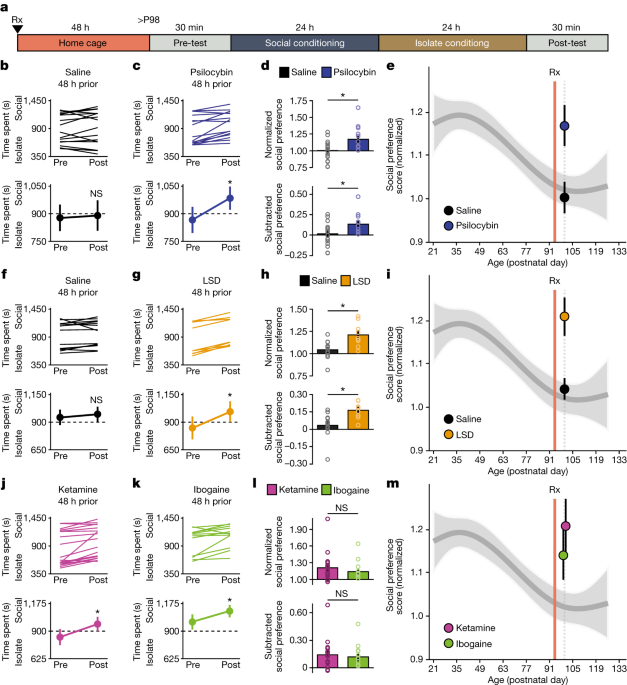"Psychedelics reopen the social reward learning critical period."
This came out last year but I only found out about it today.
"During specific periods of brain development, the nervous system exhibits heightened sensitivity to ethologically relevant stimuli, as well as increased malleability for synaptic, circuit and behavioural modifications."
"Ethologically relevant" means... relevant to how an animal relates to its natural environment?
"These mechanistically constrained windows of time are called critical periods and neuroscientists have long sought methods to reopen them for therapeutic benefit. Recently, we have discovered a novel critical period for social reward learning and shown that the empathogenic psychedelic MDMA is able to reopen this critical period. This mechanism shares a number of features with the therapeutic effects of MDMA-assisted psychotherapy for the treatment of PTSD, including rapid onset, durability and context dependence."
Ok, so this experiment is based on a technique called "social reward conditioned place preference" for mouse experiments.
"Mice were socially housed (3-5 males) in a cage containing corncob bedding until the pre-determined age for social reward conditioned place preference testing. Each mouse was used for only one behavioural time point. At the pre-determined age, mice were placed in an open field activity chamber equipped with infrared beams and a software interface to monitor the position of the mouse. The apparatus was partitioned into two equally sized zones using a clear Plexiglas wall, with a 5 cm diameter circular hole at the base; each zone contained one type of novel bedding. The amount of time spent freely exploring each zone was recorded during 30-min test sessions. For example, a score of 900 means that the mouse spent exactly 50% of its time on each of the two beddings, whereas a score of 1,800 means that it spent the full 30 min in the bedding that would be subsequently assigned as the social conditioning cue, and no time in the bedding that would be assigned as the isolation conditioning cue. After an initial pre-conditioning trial to establish baseline preference for the two sets of bedding cues, mice were assigned to receive social conditioning (with cage mates) for 24 h on one type of bedding, followed by 24 h of isolation conditioning (without cage mates) on the other bedding cue. To assure unbiased design, chamber assignments were counterbalanced for side and bedding cues. Immediately after the isolation conditioning, a 30-min post-conditioning trial was conducted to establish preference for the two conditioned cues. Conditioned place preference is a learned association between a condition (for example, social) and a cue (bedding). It does not require scent from the other mice, as the bedding itself serves as the cue."
Got that? I'm going to deliberately avoid quoting more from the paper because they use a lot of, um, chemical names that these online information distribution systems such as the one you're using right now disapprove of. (I'm going to let "MDMA" slip though and see if I get away with it.)
Basically the research shows MDMA reinstates social reward learning in a serotonin receptor 2A-independent manner.
"To directly compare treatment-related transcriptional changes specific to the shared ability of psychedelics to reopen the social reward learning critical period, we analysed the gene expression dataset between conditions in which the critical period is in the open state versus conditions where the critical period remains in or returns to the closed state. Using this approach, we identified 65 genes that were significantly differentially expressed. Gene set enrichment analysis of this list identified significant enrichment of ontologies associated with endothelial development, regulation of angiogenesis, vascular development and tissue morphogenesis. Of note, many of the top scoring genes are components of the extracellular matrix or have been implicated in its remodelling, including: Fn1, Mmp16, Trpv4, Tinagl1, Nostrin41, Cxcr4, Adgre5, Robo4 and Sema3g45."
I didn't Google all those genes to see what is known about their function but you're welcome to. I wish I had more time to study the brain, but there is so much to learn and I don't have more time to devote to it right now.
"Additionally, the differentially expressed gene set includes the immediate early genes Fos, Junb, Arc and Dusp. When we did not control for the psychedelic-specific psychoactive response, we identified 39 differentially expressed genes; however, enrichment analysis identified no significant ontologies associated with this gene set, and only 6 genes (Hspa12b, Sema3g, Eng, Flt4, Cavin1, and Ube4b) overlapped with the differentially expressed genes in the open state versus closed state dataset. These results provide evidence that the shared ability of psychedelics to reopen the social reward learning critical period converges at transcriptional regulation of the extracellular matrix. On the basis of these findings, our working model posits that psychedelics act at a diverse array of binding targets (such as sodium-dependent serotonin transporter (SERT), serotonin receptor 2A (5-HT2AR), N-methyl-d-aspartate receptor (NMDA), and kappa-opioid receptor (KOR)), to trigger a downstream signalling response that leads to activity-dependent (perhaps via immediate early genes-mediated coincidence detection) degradation of the extracellular matrix, which in turn is the permissive event that enables metaplasticity. In this model, transcriptional upregulation of extracellular matrix components (for example, Fibronectin (FN1)) and downregulation of extracellular matrix proteolytic enzymes (for example, Matrix Metalloproteinase 16 (MMP-16)), reflects the homeostatic response to these long-lasting cellular changes."
There's a lot more technical work in the paper. But basically, the researchers were able to find evidence of reopening of social learning with the "social reward conditioned place preference" technique, identify brain receptors and even an assortment of genes involved. This is all in mice. Implications for humans not yet known.
#discoveries #neuroscience #psychedelics #criticalperiod #mdma
